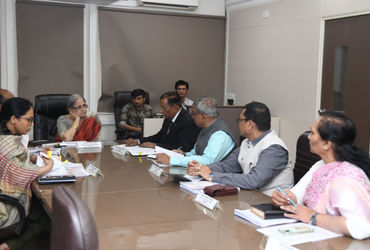
Surat: The Gujarat government has begun discussions on the implementation of the Uniform Civil Code (UCC), a legal reform designed to provide uniform personal laws for all citizens, regardless of their religion, during a significant committee meeting in Surat.
The meeting was chaired by the Surat District Collector and included representatives from various organizations who shared their opinions and suggestions regarding the UCC. Notable attendees included Justice Ranjana Desai (Retired Supreme Court Judge and Chairperson of the UCC Committee), Advocate R.C. Koddekar, former Vice-Chancellor Dakshesh Thakar, and social activist Geetaben Shroff, all of whom are committee members.
The discussions aimed to gather diverse perspectives, concerns, and recommendations from stakeholders prior to drafting a final proposal.
Gujarat is actively pursuing the implementation of the UCC, following Uttarakhand, which recently became the first state in India to pass a UCC bill.
The Gujarat government had previously announced the establishment of an expert committee to examine and propose a framework for implementing the UCC. This committee has been collecting insights from legal experts, social organizations, and religious groups to ensure a comprehensive and inclusive approach.
The Uniform Civil Code (UCC) seeks to create a standardized set of laws governing marriage, divorce, inheritance, and adoption for all citizens, irrespective of religious beliefs.
At present, personal laws in India vary based on religion, with Hindus, Muslims, Christians, and other communities operating under separate legal frameworks. The UCC aims to establish uniformity, promote gender equality, and advance social justice within personal laws by reducing discrimination and simplifying legal complexities. It will consolidate various personal laws into a single legal system, ensuring equal treatment for all individuals and addressing gender-based discrimination found in some religious personal laws, particularly concerning marriage, divorce, and inheritance.
By unifying personal laws, the UCC aims to foster national integration and diminish communal legal disparities.
Implementing a single code for all citizens will enhance legal efficiency and decrease litigation resulting from conflicting personal laws. The Gujarat government, through its expert committee, will continue to solicit feedback from diverse communities, legal experts, and social organizations as it formulates a final proposal for UCC implementation. Once the recommendations are complete, the government may present a bill to the Gujarat Legislative Assembly for further discussion and approval.
